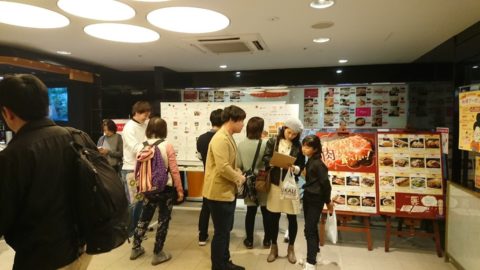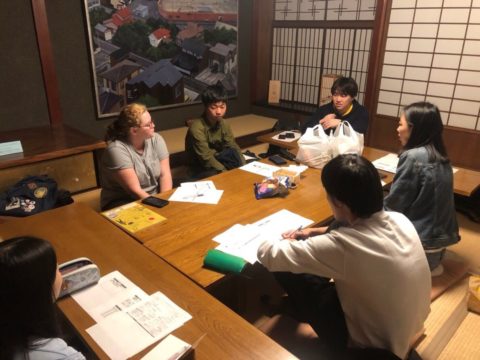観光客に便利な金沢駅を
KANAZAWA INBOUND PROJECT
グローバル情報学科4年 木田颯一 / Kida Soichi
世界で役立つグローバルイノベーターの育成を目指す国際高専。今日は国際交流と地元貢献に取り組んだ学生に出会いました。グローバル情報学科4年の木田颯一さんは金沢青年会議所(JCI)が開催するKANAZAWA INBOUND PROJECTに参加しました。
―木田さんが参加した「KANAZAWA INBOUND PROJECT」ってどんなプロジェクトなんですか?
金沢駅を訪れる外国の観光客へのアプローチの改善を目指すプロジェクトです。国際高専以外にも金沢工業大学、金沢大学、星稜大学、北陸大学、石川県立大学などの学生が参加しました。
―参加したのはいつ頃ですか?
去年の9月からです。最終報告会は11月で、約2か月間のプロジェクトでした。
―このプロジェクトに参加したきっかけは何だったんですか?
クラスメートが募集用のチラシを見せてくれたんです。色んな大学の学生が参加するし、外国人留学生も募集していて英語が使えそうだったので応募しました。
―実際には、どのような活動をするのですか?
4つのチームに分かれて、金沢駅の国際化をテーマにアイデアを考えるんです。俺が入ったのはサインチームで、金沢駅を訪れる外国人の観光客に使いやすい案内板を考えます。最初は週に2回集まってミーティングをしたり、実地調査を行ったりして、中間報告会を目標に活動しました。
―実地調査では、どのようなことをするんですか?
実地調査では、金沢駅を訪れていた日本人と外国人の観光客から実際に話を聞きました。最初は外国人に向けた英語表記の案内板を作ろうと思っていたのですが、意外なことに外国人は(既存の)案内板に対して特に不満を持っていませんでした。そして、日本人の観光客が1番知りたいのは地元民のオススメ情報だということもわかりました。
―なるほど、それで、木田さんのチームはどうしたんですか?
中間発表会では、加賀友禅デザインの足あと風の案内を金沢駅の床に貼るアイデアを提案したんですが、コストの関係などで却下されてしまいました。そこで次は日本人と外国人がおすすめの場所を付箋に書いてパネルに貼ることができる交流所のアイデアを考えました。それを実際に金沢駅で試したところ、インタビューした200人弱の人の8割が「交流できる所が欲しい」と答えたんです。
―金沢駅は自然と観光客が集まる場所ですし、ぴったりですね!ところで、チームはいつもどこに集まっていたんですか?
金沢学生のまち市民交流館です。古民家のような建物で大きな畳の部屋があります。放課後に集まってだいたい午後6時~10時くらいまで活動していました。実地調査をしてわかったんですが、駅に地図があるだけで人が集まってくるんです。そして、地元民も観光客にオススメしたい場所があることもわかりました。それらを貼ることができるコーナーを駅内に作れたらって思ったんです。
―良いアイデアですね。最終的にはどうなりましたか?
最後は金沢駅の偉い人相手にプレゼンがあったので、それに向けて発表の準備をしました。発表はすごく緊張しましたし、結果的には敗けてしまいました。優勝したのは飲食のチームで、外国人に向けたメニューなどを提案していました。
―残念ながら優勝とはならなかったんですね。参加した感想はどうでしたか?
人として成長できたと思います!今回はチームのサブリーダーとして人と人の橋渡しのような役割でしたが、リーダーは中国人、チーム内にも外国人がいて、英語を使う機会がたくさんありました。他にもセッティング、パワーポイントの作成、スケジュール管理など様々な仕事がありました。あと、国際高専には工業系の学生しかいませんが、今回は経営や農業など、様々なバックグラウンドの学生のチームだったので、色んな考え方をまとめる必要があって面白かったです。
―もう一度やり直すとしたら、次はどんなところをもっと上手くやりたいですか?
よくQRコードで商品の内容がスマホで表示されるのがありますが、自分のアイデアにもQRコードを付けて、リアルタイムでお店の予約ができるようにしたかったです。今回は残念ながら時間が足りませんでした。
―考え方や価値観などで、変わったものはありますか?
与えたい人と、もらいたい人の求めているモノが必ずしも同じではないことを学びました。むしろだいたい違うと思います。今回は実地調査をしなければわからないことがたくさんありました。独りよがりにならないようにインタビューなどで聞く必要があると思いました。
―ありがとうございました!最後に付け加えたいことはありますか?
やっぱり英語が役に立ったと思います。チーム内で話す時に英語と留学の経験が自信につながる武器になると感じました。(木田さんは1年間ニュージーランドへ留学)あとは、フランス人の観光客も多かったので、フランス語もやってみたいと思いました。ありがとうございました!
インタビュー:ジョナサン
A Better Kanazawa Station for Tourists
KANAZAWA INBOUND PROJECT
Department of Global Information and Management 4th year student / Kida Soichi
ICT's mission is to foster global innovators to create a better future. Today, I met a student who participated in a program to support his region and utilize his English skills. Department of Global Information and Management 4th year student Soichi Kida participated in the KANAZAWA INBOUND PROJECT hosted by Junior Chamber International KANAZAWA (JCI).
―Please tell me about the "KANAZAWA INBOUND PROJECT" that you participated in.
It's a project to improve the approach toward international tourist at Kanazawa station. Many students participated, not only from ICT, but also Kanazawa Institute of Technology, Kanazawa University, Seiryo University, Hokuriku University, and Ishikawa Prefectural University.
―When did you participate in this program?
It began in September of last year. The final presentation was in November. So, it was about two months long.
―How did you learn about this program?
One of my classmates showed my a flyer. I was interested because it was a chance to meet students from other schools and practice my English.
―What were the activities actually like?
We were divided into four teams and had to produce ideas to make a more global Kanazawa station. I was assigned to the sign team. Our team's job was to design a useful sign or direction board for international tourists. We gathered twice a week to work on our ideas. We also went to Kanazawa station for field research. Our first goal was the mid-term presentations.
―What kind to research did you do at Kanazawa station?
We talked to many tourists, both Japanese and foreign. Our first idea was to create some sort of English direction board for international tourists, but the foreigners we talked to actually didn't have any problems with the current signs in the station. Also, we learned that Japanese tourists want information about recommendations by the local people the most.
―Interesting. What did you team do?
The first idea that we proposed at the mid-term presentations was a Kagayuzen designed footprint shaped sign to paste on the floor of Kanazawa station. However, this idea was rejected due to cost issues. Our next idea was a meeting area where Japanese and International tourists can write the places they liked on sticky notes and paste them on a display board. We actually tested this idea in Kanazawa station. We asked about 200 people if they wanted such a meeting area and 80% answered "yes".
―Tourists naturally gather at stations so it sounds perfect! A quick change of subject. Where did your team gather?
We used the Kanazawa Student Community Civic Center. It's a large traditional Japanese house with a big tatami room. We usually gathered around 6 pm after school and worked until 10 pm. This was something we discovered from the field research, but tourists naturally gather around large maps. Also, local people have recommendations that the want to share with the tourists. We agreed that a meeting area could benefit both sides.
―Sounds like a great idea. How did it turn out?
The final mission was to present our idea to the executive people of Kanazawa station, so we worked on our presentation. I was very nervous during the presentation and we sadly didn't win first prize. That went to the restaurant team, who designed a useful menu for foreigners.
―I guess you can't have everything. What are your overall feelings about the program?
It was a great growing experience! Our team leader was Chinese and there were other foreign members, so I had many opportunities to act as a translator and practice my English. I also took on the role of sub-leader and had many jobs such as setting up, creating powerpoints, and team schedule management. At ICT, there are only engineer students. However, this team had students from different backgrounds such as management and agriculture. It was interesting to organize everyone's ideas.
―If you had another chance at this program, what would you do differently?
Sometimes there are shops with QR codes that you can scan and show the details on your smart phone. I wish we could have added this to our idea. For example, being able to actually make a reservation through the QR code. Sadly, we did not have enough time.
―Has this experience has changed the way you think in any way?
I learned that the things people assume people want and things people actually want are not always the same. I would go as far to say that the are most likely not the same. Many of the things that tourists really want, we discovered only by actually asking people in the field research. I believe that to truly understand people's needs, it is necessary to actually ask people like we did in the interviews and not assume them on our own.
―Thank you for your time! Is there anything you would like to add before we finish?
I reinforced my belief that English is one of the most useful tools one can have. It helped me communicate with my teammates and my experience studying abroad boosted my confidence. (Soichi studied in New Zealand for one year) Also, there were a surprising number of French tourists, so I want to work on my French skills as well. Thank you!
Interviewer: Jonathan





